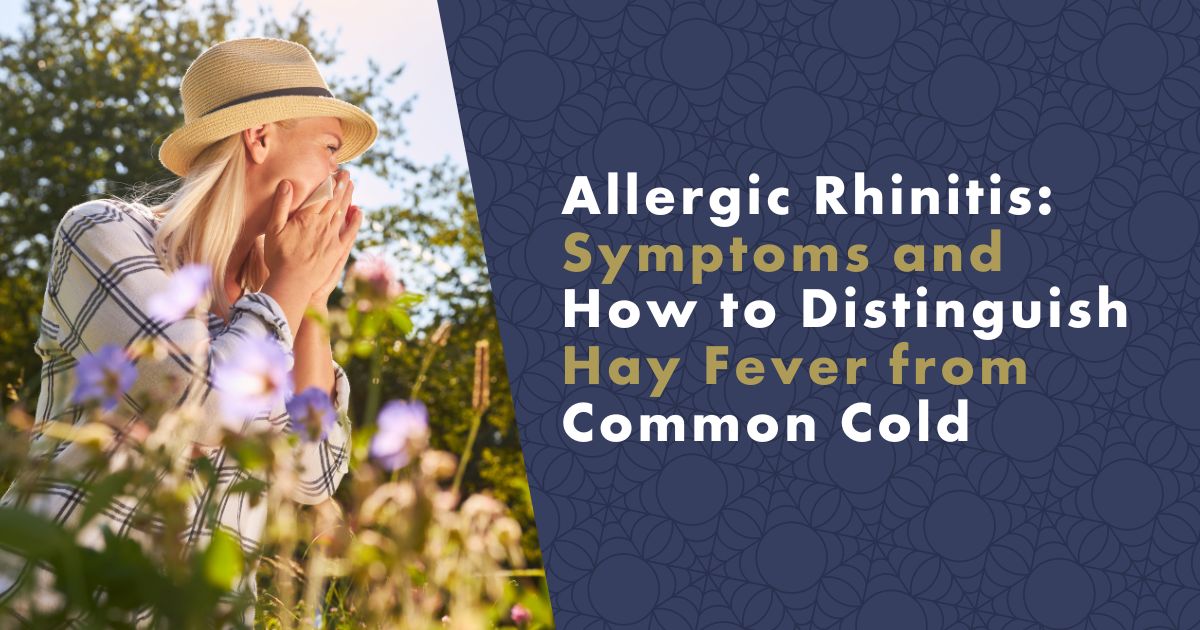Allergies are becoming increasingly common in our everyday lives, and many people suffer from various allergic reactions. One of the most common forms of allergy is allergic rhinitis. How to recognize that it is allergic rhinitis, and how does hay fever differ from common cold? In this article, we'll take a detailed look at the symptoms of allergic rhinitis and provide you with useful information on how to distinguish it from common cold and flu.

What is Allergic Rhinitis
Allergic rhinitis, also known as hay fever, is a chronic inflammation of the nasal mucosa caused by an allergic reaction to various allergens. These allergens may include plant pollen, dust, mold, or feathers.
When a person allergic to these allergens comes into contact with them, their body reacts by producing excessive histamine, leading to various symptoms. Current estimates suggest that 20 to 25% of the population suffers from allergic rhinitis, and it is not advisable to underestimate it – untreated allergic rhinitis can lead to the development of asthma.

Tip: How to recognize allergy – symptoms and manifestations? Read on the blog.
Symptoms of Allergic Rhinitis
Symptoms of allergic rhinitis may vary from individual to individual, but there are several common symptoms that indicate you have allergic rhinitis:
- Nasal congestion and itching,
- Runny nose and congestion,
- Watery eyes,
- Cough and sore throat,
- Fatigue and irritability.
Types of Allergic Rhinitis
Allergic rhinitis is divided into two basic types: seasonal and perennial rhinitis. Seasonal allergic rhinitis occurs only during certain seasons, while perennial rhinitis occurs all year round.
Triggers of seasonal allergic rhinitis may include pollens or molds. Its symptoms usually include severe itching of the nasal mucosa, watery eyes, nasal congestion, severe sneezing, nasal discharge, and throat scratching.
In perennial rhinitis, the cause may be allergy to domestic animals (allergy to dogs and cats is among the most common), dust mites, medications, foods, or molds. It manifests as swollen nasal mucosa and a feeling of nasal congestion.

Tip: Do you know how to fight pollen allergy in spring? Find out in another article.
How Allergic Rhinitis Differs from Common Cold
You may wonder how to distinguish allergic rhinitis from common cold. Initially, it's not so simple; both conditions can cause nasal mucosal swelling and increased mucus production. Additional symptoms will help you distinguish between allergy and common cold.
Classic cold is usually of viral origin, whereas hay fever is a chronic condition.
Common cold usually starts with sneezing, continues with a stuffy nose, and then triggers mucus production, which may even have a greenish color. At the same time, there may be an increased temperature, fatigue, sore throat, sinus pain, or cough.
Allergic rhinitis manifests as clear watery nasal discharge, bouts of sneezing, and itching of the eyes and nose. There's no fever or elevated temperature.
Who Is Most at Risk of Allergic Rhinitis
Increased risk of allergic rhinitis is primarily found in children from families with allergies and in people with chronic respiratory diseases.
#produkty#https://www.nanospace.store/nasal-wash/
Tip: Check out the blog how to rinse your nose for the best prevention against allergies.
How to Get Rid of Allergic Rhinitis
If you are an allergy sufferer, then allergic rhinitis can be treated in two ways — naturally or with pharmaceutical products. The severity of the condition is decisive, but in any case, consult with your doctor.
Nasal sprays, nasal irrigation, or eye drops are particularly helpful against allergic rhinitis.
#produkty#https://www.nanospace.store/nasal-sprays/
Tip: Nasal Sprays: How to Choose and What They're Suitable For? More on the blog.
Prevention Against Allergic Rhinitis
Wondering what you can do for yourself? There are a number of measures that can help you reduce symptoms of allergic rhinitis:
- Maintain an allergen-free environment: try to dust, vacuum, and take care of bedding more frequently.
- Monitor the pollen calendar: keep track of when it's the season for "your" allergens.
- Minimize ventilation: ventilate only briefly and preferably after rain or use air purifiers.
- Do not smoke: avoid both smoking environments and passive environments.
- Wear sunglasses or head covering: wear sunglasses outdoors and immediately change clothes upon returning home, preferably wash your hair every evening.
- Take allergy medications.
Learn More About Allergies:
Frequently Asked Questions
How often does allergic rhinitis occur?
Allergic rhinitis is a very common problem and affects millions of people worldwide.
Can allergic rhinitis cause serious complications?
Usually not, but long-term or uncontrolled symptoms of allergic rhinitis can lead to chronic inflammation of the nasal mucosa.
Are there any home remedies for relief from allergic rhinitis?
Yes, some home remedies, such as using saline nasal solution or frequent dusting and wiping, can help alleviate symptoms of allergic rhinitis.
How long can allergic rhinitis last?
Allergic rhinitis can be a persistent problem, but proper treatment can alleviate its symptoms.
Can allergic rhinitis become a serious allergy?
In some cases, allergic rhinitis can lead to asthma, which is a more serious allergic reaction.
Is allergic rhinitis contagious?
No, allergic rhinitis is not contagious. Allergic rhinitis is the body's immune response to specific allergens. This means that it cannot be transmitted from one person to another through physical contact or airborne routes, as is the case with some infectious diseases.
Sources
- GREINER, Alexander N., et al. Allergic rhinitis. The Lancet, 2011, 378.9809: 2112-2122.
- WHEATLEY, Lisa M.; TOGIAS, Alkis. Allergic rhinitis. New England Journal of Medicine, 2015, 372.5: 456-463.
- PLAUT, Marshall; VALENTINE, Martin D. Allergic rhinitis. New England Journal of Medicine, 2005, 353.18: 1934-1944.
- KAKLI, Hasan A.; RILEY, Timothy D. Allergic rhinitis. Primary Care: Clinics in Office Practice, 2016, 43.3: 465-475.
- SMALL, Peter; KIM, Harold. Allergic rhinitis. Allergy, Asthma & Clinical Immunology, 2011, 7.1: 1-8.

